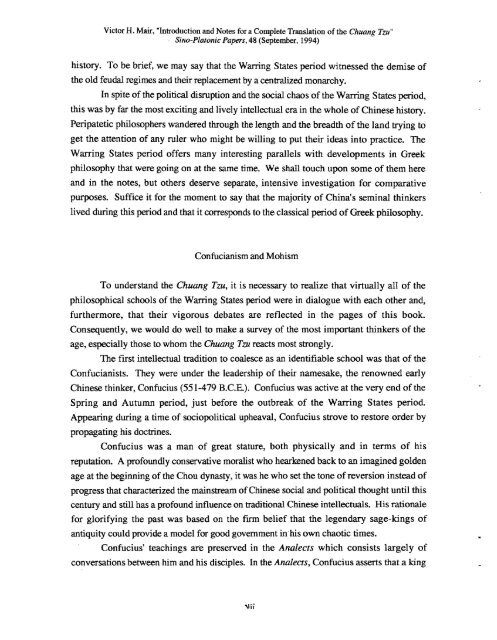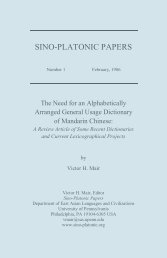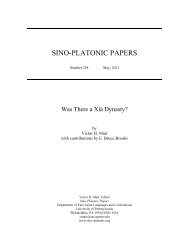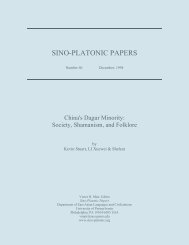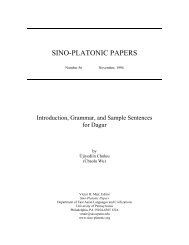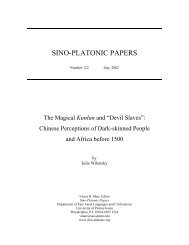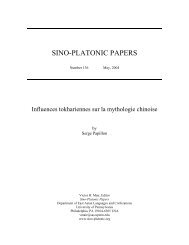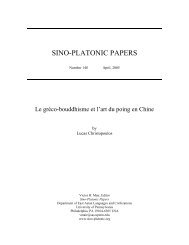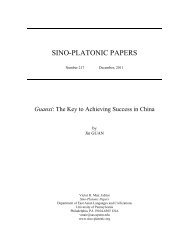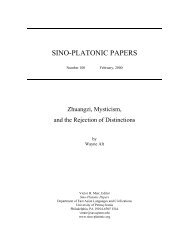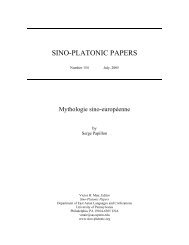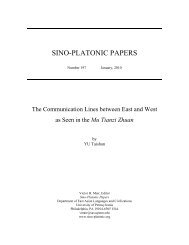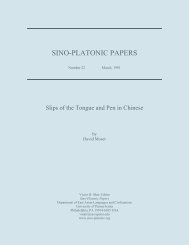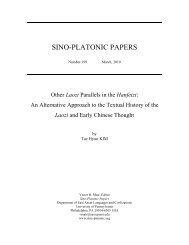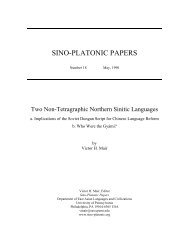Introduction and Notes for a Complete Translation of the Chuang Tzu
Introduction and Notes for a Complete Translation of the Chuang Tzu
Introduction and Notes for a Complete Translation of the Chuang Tzu
Create successful ePaper yourself
Turn your PDF publications into a flip-book with our unique Google optimized e-Paper software.
Victor H . Mair, "Inboduc tion <strong>and</strong> <strong>Notes</strong> <strong>for</strong> a <strong>Complete</strong> <strong>Translation</strong> <strong>of</strong> <strong>the</strong> <strong>Chuang</strong> Tm "<br />
. Sino-Platonic Papers, 48 (September, 1994)<br />
history. To be brief, we may say that <strong>the</strong> Warring States period witnessed <strong>the</strong> demise <strong>of</strong><br />
<strong>the</strong> old feudal regimes <strong>and</strong> <strong>the</strong>ir replacement by a centralized monarchy.<br />
In spite <strong>of</strong> <strong>the</strong> political disruption <strong>and</strong> <strong>the</strong> social chaos <strong>of</strong> <strong>the</strong> Waning States period,<br />
this was by far <strong>the</strong> most exciting <strong>and</strong> lively intellectual era in <strong>the</strong> whole <strong>of</strong> Chinese history.<br />
Peripatetic philosophers w<strong>and</strong>ered through <strong>the</strong> length <strong>and</strong> <strong>the</strong> breadth <strong>of</strong> <strong>the</strong> l<strong>and</strong> trying to<br />
get <strong>the</strong> attention <strong>of</strong> any ruler who might be willing to put <strong>the</strong>ir ideas into practice. The<br />
Warring States period <strong>of</strong>fers many interesting parallels with developments in Greek<br />
philosophy that were going on at <strong>the</strong> same time. We shall touch upon some <strong>of</strong> <strong>the</strong>m here<br />
<strong>and</strong> in <strong>the</strong> notes, but o<strong>the</strong>rs deserve separate, intensive investigation <strong>for</strong> comparative<br />
purposes. Suffice it <strong>for</strong> <strong>the</strong> moment to say that <strong>the</strong> majority <strong>of</strong> China's seminal thinkers<br />
lived during this period <strong>and</strong> that it corresponds to <strong>the</strong> classical period <strong>of</strong> Greek philosophy.<br />
Confucianism <strong>and</strong> Mohism<br />
To underst<strong>and</strong> <strong>the</strong> <strong>Chuang</strong> <strong>Tzu</strong>, it is necessary to realize that virtually all <strong>of</strong> <strong>the</strong><br />
philosophical schools <strong>of</strong> <strong>the</strong> Warring States period were in dialogue with each o<strong>the</strong>r <strong>and</strong>,<br />
fur<strong>the</strong>rmore, that <strong>the</strong>ir vigorous debates are reflected in <strong>the</strong> pages <strong>of</strong> this book.<br />
Consequently, we would do well to make a survey <strong>of</strong> <strong>the</strong> most important thinkers <strong>of</strong> <strong>the</strong><br />
age, especially those to whom <strong>the</strong> <strong>Chuang</strong> <strong>Tzu</strong> reacts most strongly.<br />
The first intellectual tradition to coalesce as an identifiable school was that <strong>of</strong> <strong>the</strong><br />
Confucianists. They were under <strong>the</strong> leadership <strong>of</strong> <strong>the</strong>ir namesake, <strong>the</strong> renowned early<br />
Chinese thinker, Confucius (55 1-479 B.C.E.). Confucius was active at <strong>the</strong> very end <strong>of</strong> <strong>the</strong><br />
Spring <strong>and</strong> Autumn period, just be<strong>for</strong>e <strong>the</strong> outbreak <strong>of</strong> <strong>the</strong> Warring States period.<br />
Appearing during a time <strong>of</strong> sociopolitical upheaval, Confucius strove to restore order by<br />
propagating his doctrines.<br />
Confucius was a man <strong>of</strong> great stature, both physically <strong>and</strong> in terms <strong>of</strong> his<br />
reputation. A pr<strong>of</strong>oundly conservative moralist who hearkened back to an imagined golden<br />
age at <strong>the</strong> beginning <strong>of</strong> <strong>the</strong> Chou dynasty, it was he who set <strong>the</strong> tone <strong>of</strong> reversion instead <strong>of</strong><br />
progress that characterized <strong>the</strong> mainstream <strong>of</strong> Chinese social <strong>and</strong> political thought until this<br />
century <strong>and</strong> still has a pr<strong>of</strong>ound influence on traditional Chinese intellectuals. His rationale<br />
<strong>for</strong> glorifying <strong>the</strong> past was based on <strong>the</strong> firm belief that <strong>the</strong> legendary sage-kings <strong>of</strong><br />
antiquity could provide a model <strong>for</strong> good government inhis own chaotic times.<br />
Confucius' teachings are preserved in <strong>the</strong> Analects which consists largely <strong>of</strong><br />
conversations between him <strong>and</strong> his disciples. In <strong>the</strong> Analects, Confucius asserts that a king


